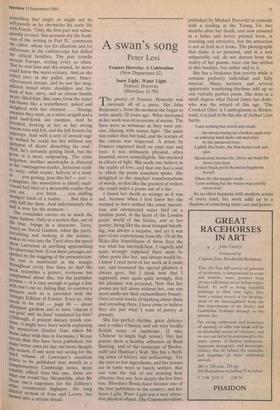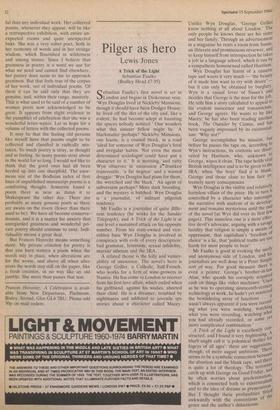A swan's song
Peter Levi
Snow Light, Water Light Frances Horovitz (Bloodaxe £1.50) rr he poetry of Frances Horovitz was 1 curiously all of a piece, like John Betjeman's, from the moment she began to write nearly 20 years ago. What increased in her work was an economy of means. The lines were as sensuous as they were pre- cise, blazing with winter light. The paint was rather thin but bold, and the texture of the canvas was respected. A poem by Frances engraved itself on your ears and eyes: it was intimately physical, often haunted, never unintelligible. She rejoiced in effects of light. She made one believe in the reality of love, and that one had a soul to which the poem somehow spoke. She delighted in the simplest transformations of words, so that like the greatest of writers she could make a poem out of a list.
I found her death as strange as it was sad, because when I first knew her she seemed to have settled like some marvel- lous and unexpected water bird on a familiar pond, at the heart of the London poets' world of the Sixties, and so her poetry, being like the most tranquil breath- ing, was always a surprise, and yet it was part of my expectations from life. Of all the Blake-like hopefulness of those days she was what has survived best. I vaguely and quite wrongly supposed there must be other poets like her, and always would be. I know I read most of her work as it came out, and treasured the special pleasure it always gave, but I think now that I supposed, once again quite wrongly, that the pleasure was personal. Now that her poems are left alone without her, one can more easily see their extraordinary beauty. Over several weeks of thinking about them and rereading them, I have come to believe they are just what I want of poetry at present.
She has perfect rhythm, great delicacy and a rather Chinese and yet very locally British sense of landscape. (I take 'Chinese' to imply high praise). Her last poems show a healthy influence of Basil Bunting, and of the landscape of Birdos- wald and Hadrian's Wall. She has a thrill- ing sense of history and archaeology. Yet she uses so few ingredients, and her poems are in some ways so barely written, that one runs the risk of not noticing how effective they are, how deeply the few lines bite. Bloodaxe Books have become one of the best publishers in the country, and her Snow Light, Water Light was a very attrac- tive physical object. The Commemoration,
published by Michael Horovitz to coincide with a reading at the Young Vic two months after her death, and now reissued in a fuller and better printed form, is touching and attractive, but the attraction is not as frail as it looks. The photographs that make it so personal, and in a way unbearably sad, do not detract from the reality of her poems, once one has settled to this booklet, but rather add to it.
She has a briskness that revives while it remains perfectly individual and fully musical. Many textures and several apparently wandering rhythms add up to one verbally perfect poem. She does in a small degree what David Jones has done, who was the wizard of this age. 'The Crooked Glen' is Camboglanna at Birdos- wald; it is said to be the site of Arthur's last battle.
'I saw nothing but waves and winds'
. . . the moon resting on a broken apple tree an ushering wind shake ash and alder by the puckered river.
Lightly like boats, the thin leaves rock and spin.
Blood-dark berries stir; above my head the thorn trees lean.
In their black pools the moon fragments herself.
Ghost dry the unquiet reeds . . .
'I saw nothing but the waters wap and the waves wan'.
As so often happens with modern artists of every kind, her work adds up to a shadow of something more vast and power-
ful than any individual work. Her collected poems, whenever they appear, will be like a retrospective exhibition, with entire un- expected rooms and quite unexpected links. She was a very sober poet, both in her economy of words and in her strange wisdom, which flourished in wilderness and among stones. Since I believe that greatness in poetry is a word we use for what we need and cannot find elsewhere, her poetry does seem to me to approach greatness. But that feels true of the corpus of her work, not of individual poems. Of them it can be said only that they are genuine, and, within their range, masterly. That is what used to be said of a number of women poets now acknowledged to be great. It appears from slight evidence in the pamphlet of celebration that she was a wonderful letter-writer. Let us hope for a volume of letters with the collected poems.
It may be that the feeling old persons like myself have that poems ought to he collected and classifed is radically mis- taken. So much poetry is stray, as thought and as feeling. So many poems stray about in the world for so long. I would not like to think that the good ones had all been herded up into one sheepfold. The enor- mous size of the Bodleian index of first lines of unpublished manuscript poems is a comforting thought. Someone found a poem there as near as damn it to Shakespeare the other day. There are probably as many genuine poets as there are swans on the rivers (fewer than there used to be). We have all become conserva- tionists, and it is a matter for anxiety that unregarded greatness and wonderful pri- vate poetry should continue to exist. Indi- viduality means a great deal.
But Frances Horovitz means something more. My private criterion for poetry is that you have written a poem when the words stay in place, when alterations are for the worse, and above all when after years the words stay still on the paper, like a fresh creation, in no way like an old jumble. She more than passes that test.



















































 Previous page
Previous page